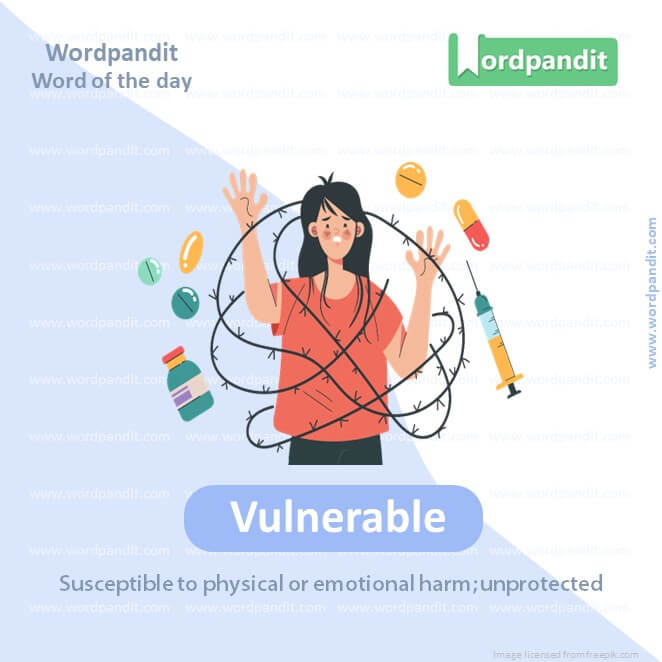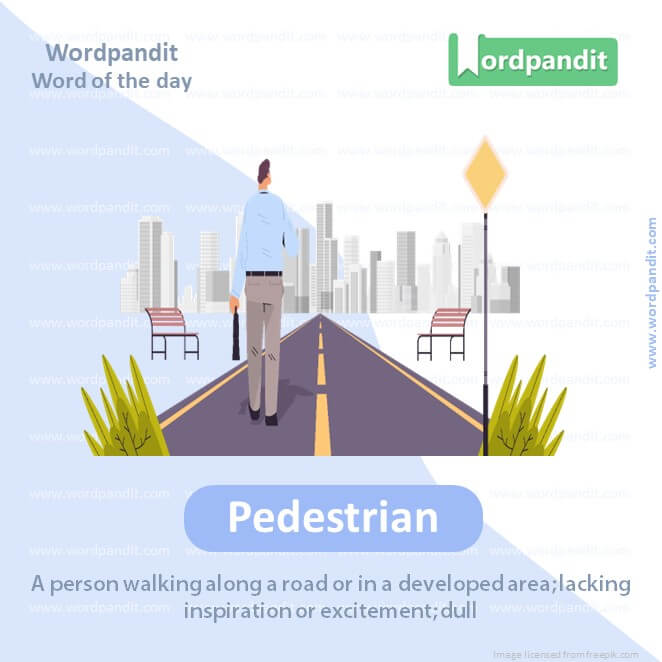Daily Vocabulary Words: List of Daily Used Words in Leading Indian Newspapers
Hi there. Welcome to this special section @ Wordpandit. Our endeavour here is straightforward: highlighting daily vocabulary words that you would come across in leading newspapers in the country. We have included the following newspapers in our selection:
• The Times of India
• The Economic Times
• Hindustan Times
• Mint
• Indian Express
We are putting in extensive work to develop your vocabulary. All you have to do is be regular with this section and check out this post daily. This is your repository of commonly used words; essentially, we are posting a list of daily used words. Hence, this has significant practical application as it teaches you words that are commonly used in leading publications mentioned above.
Visit the website daily to learn words from leading Indian newspapers.

WORD-1: Philanthropy
CONTEXT: The generous philanthropy of the industrialist made it possible for the city to open its first public library.
SOURCE: The Times of India
EXPLANATORY PARAGRAPH: Philanthropy is when people give their money, their time, or things they no longer need to help other people who are not as lucky. It’s like giving your old toys that you don’t use anymore to kids who don’t have any toys.
MEANING: The giving away of money, esp. in large amounts, to organizations that help people (Noun).
PRONUNCIATION: fi-LAN-thruh-pee
SYNONYMS: Charitable, Altruism, Generosity, Donation, Humanitarianism, Benevolence, Benefaction.
USAGE EXAMPLE:
1. His PHILANTHROPY was recognized with several awards.
2. She is known for her PHILANTHROPY towards homeless shelters.
3. PHILANTHROPY runs in their family.
4. Big companies often indulge in PHILANTHROPY.
WORD-2: Retreat
CONTEXT: When the stress became too much, she decided to retreat to a quiet country cottage for some much-needed rest.
SOURCE: Hindustan Times
EXPLANATORY PARAGRAPH: Retreat means to go away from something. Like if you’re playing a game of tag and your brother is ‘it’, you might retreat by running away and hiding.
MEANING: Withdraw from a place, situation or confrontation (Verb).
PRONUNCIATION: ri-TREET
SYNONYMS: Withdraw, Fall Back, Pull Out, Recede, Back off.
USAGE EXAMPLE:
1. The army had to RETREAT after heavy losses.
2. He RETREATed to his room after the argument.
3. Once she saw him, she RETREATed quickly.
4. The bear RETREATed when it saw the human.
WORD-3: Urns
CONTEXT: The archeologists discovered a number of ancient urns during the excavation. Each was delicately painted and hinted at the region’s rich heritage.
SOURCE: The Economic Times
EXPLANATORY PARAGRAPH: Urns are like very big cups or jars. Sometimes, people use urns to keep the ashes of someone who has died. Or sometimes, urns are used to keep things like cookies and candy.
MEANING: A tall, round vessel for holding liquids or, in some cultures, the cremated remains of the dead (Noun).
PRONUNCIATION: urns
SYNONYMS: Jar, Vase, Vessel, Pot, Container.
USAGE EXAMPLE:
1. The ashes were kept in a beautiful URN.
2. The ancient URN was discovered in the ruins.
3. They kept fresh flowers in an URN near the entrance.
4. The museum had a collection of URNS from different civilizations.

WORD-4: Vulnerable
CONTEXT: The sudden outbreak of the pandemic left the country’s economy in a vulnerable state, escalating the need for quick, decisive action.
SOURCE: Mint
EXPLANATORY PARAGRAPH: Vulnerable is a word that you use when you can get hurt easily. It’s like when you don’t wear a helmet while riding your bike, you are vulnerable because you might fall and hurt your head.
MEANING: Susceptible to physical or emotional harm; unprotected (Adjective).
PRONUNCIATION: VUL-ner-uh-bul
SYNONYMS: Exposed, At risk, In danger, Unsafe, Unprotected.
USAGE EXAMPLE:
1. The young ones are VULNERABLE and need protection.
2. The virus is dangerous to the more VULNERABLE among us.
3. The trade sanctions left the economy VULNERABLE.
4. She felt VULNERABLE without her family around.

WORD-5: Pedestrian
CONTEXT: The city council is increasing safety measures to protect pedestrian rights in the busy city center.
SOURCE: Indian Express
EXPLANATORY PARAGRAPH: Pedestrian is a fancy word for someone who is walking. So, if you’re at the park and you’re walking around, you’re a pedestrian!
MEANING: A person walking along a road or in a developed area; lacking inspiration or excitement; dull (Noun).
PRONUNCIATION: pe-DES-tree-uhn
SYNONYMS: Walkers, Foot-travellers, Strollers, Hikers, Trekkers.
USAGE EXAMPLE:
1. The city has installed new PEDESTRIAN crossings for safety.
2. More and more cities are becoming PEDESTRIAN-friendly.
3. He was a PEDESTRIAN who got hit by a car.
4. The police often advice PEDESTRIANS to use crosswalks.

WORD-6: CHERISH
CONTEXT: In the midst of the fast-paced urban lifestyle, we often forget to cherish the joys that nature brings.
SOURCE: The Times of India
EXPLANATORY PARAGRAPH: When you cherish something, you hold it very dear or close to your heart. For example, if you really love your teddy bear, you cherish it. You take care of it, hug it tight when you sleep, and make sure it doesn’t get lost or damaged. In short, you cherish things or people you love and care about the most.
MEANING: To protect and care for (someone) lovingly; to hold dear (Verb).
PRONUNCIATION: CHE-rish
SYNONYMS: Adore, Treasure, Value, Appreciate, Love, Hold dear, Esteem
USAGE EXAMPLES:
1. The glimpse of her mother made her cherish the memories of childhood.
2. She cherished the gift that her grandmother had given her.
3. I cherish the time spent with you.
4. We need to cherish and protect our natural environment.

WORD-7: SWAY
CONTEXT: The political landscape is subject to change, and public opinion continues to sway between different parties as the election approaches.
SOURCE: The Economic Times
EXPLANATORY PARAGRAPH: Sway is like a gentle swing back and forth. Imagine you are on a swing in the park, and how you move back and forth, that’s sway. But sway can also mean to convince, like when you really want an extra piece of cake and you talk your mom into giving you one, you’ve swayed her!
MEANING: Control or influence (a person or course of action) (Noun).
PRONUNCIATION: sway
SYNONYMS: Swing, Shift, Influence, Control, Tilt, Oscillate, Rock
USAGE EXAMPLES:
1. The trees swayed in the breeze.
2. He has a sway over his friends’ decisions.
3. The singer swayed to the rhythm of the music.
4. The jury was swayed by the compelling argument of the lawyer.
WORD-8: IMPUDENT
CONTEXT: The critic was impudent with his remarks about the debutant’s performance, sparking a heated debate amongst the readers.
SOURCE: Hindustan Times
EXPLANATORY PARAGRAPH: Impudent is when someone is not being nice or respectful. Imagine if someone took your toy without asking, and when you asked for it back, they stuck out their tongue at you! That would be them being impudent.
MEANING: Showing a lack of respect or courtesy, bold and shameless. (Adjective)
PRONUNCIATION: IM-pu-dent
SYNONYMS: Rude, Insolent, Brazen, Disrespectful, Cheeky, Audacious, Arrogant
USAGE EXAMPLES:
1. The boy was punished for his impudent behaviour.
2. She had an impudent attitude towards her teachers.
3. The businessman was impudent in his dealings.
4. The impudent remarks of the comedian triggered an uproar.
WORD-9: BLIGHTED
CONTEXT: The once prospering apple orchards are now blighted, a consequence of unchecked pesticide use and relentless weather vagaries.
SOURCE: Mint
EXPLANATORY PARAGRAPH: Blighted is like when your favourite teddy bear gets old and worn out, or a plant in your garden gets sick and withers. Something that once was healthy and good now isn’t because something bad has happened to it.
MEANING: To cause harm or damage to. (Verb) OR In a badly damaged or deteriorated condition. (Adjective)
PRONUNCIATION: BLY-ted
SYNONYMS: Damaged, Destroyed, Ruined, Marred, Spoilt, Wrecked, Ravaged
USAGE EXAMPLES:
1. The disease blighted the crops.
2. Urbanization has blighted the green landscape.
3. The scandal had blighted his career.
4. He lives in a blighted area of the city.
WORD-10: ATROCITY
CONTEXT: The atrocity of the crime shook the entire nation, paving the way for urgent judicial reforms.
SOURCE: Indian Express
EXPLANATORY PARAGRAPH: Atrocity is a big, bad, scary thing that someone does. Like if someone bullies lots of kids in the playground or hurts someone really badly, that’s an atrocity. It’s something so mean or cruel, it makes people feel very upset and angry.
MEANING: An extremely wicked or cruel act, typically involving physical violence or injury. (Noun)
PRONUNCIATION: a-TROC-i-ty
SYNONYMS: Outrage, Horror, Atrocity, Abomination, Barbarity, Cruelty, Savagery
USAGE EXAMPLES:
1. The atrocity of the crime left everyone shocked.
2. War atrocities were reported in the news.
3. The city saw several atrocities during the conflict.
4. They will never forget the atrocities perpetrated against them.
vocabulary correction
Vocabulary correction plays a critical role in enhancing the eloquence of our verbal and written communication. It is necessary to conquer the nuances of a language and get the message across clearly.
Learning vocabulary correction shouldn’t come across as a daunting task laden with an overbearing list of complicated words. In fact, it’s a lifelong journey that evolves continuously with constant learning and usage. So, how exactly does one embark on this journey of vocabulary correction?
Initially, it’s essential to read extensively. Make books, newspapers, blogs and scholarly articles your best friends. They are the potential wellsprings of words waiting to enrich your vocabulary. As you come across unfamiliar words or phrases, have a dictionary and thesaurus handy to comprehend their meanings and usage.
Next, regularly engaging in vocabulary games and quizzes is a fun method of vocabulary correction that shouldn’t be understated. Not only does it expand your knowledge, but it also tests your current vocabulary prowess. Word puzzles, crosswords, and language learning mobile applications offer great platforms for this.
Writing is another powerful tool for effective vocabulary correction. Jotting down thoughts, ideas, or chronicling day-to-day experiences helps us weave words together, enhancing our vocabulary use. You look for the right words to express yourself, and in the process, you learn the correct usage of previously unfamiliar words.
No course of vocabulary correction is complete without active conversation. Engaging in meaningful dialogues introduces us to different styles and manners of speech. We pick up new words and expressions that we may not stumble upon during solitary reading or writing.
Lastly, vocabulary correction involves continuous practice and diligence. Language learning is not a one-and-done deal. It’s a consistent task of engaging, experimenting, and adapting. Remember, vocabulary correction can be monumentally effective education; make sure you learnt it the right way.







